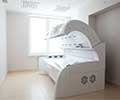
‘Multidrug-resistant cancer cells lose their ability to resist drugs for at least five days when treated with this nanotechnology that uses nanoparticles loaded with drugs and a near-infrared (NIR) laser irradiation. This technique creates a therapeutic window for chemotherapy.’
Tweet it Now
By administering chemotherapy within this 'therapeutic window,' oncologists could apply a lower dose of chemotherapy drugs to patients, with the potential for an improved treatment outcome - all while minimizing drug toxicity to healthy organs.One of the primary reasons cancer cells develop resistance is the over-expression of what are known as efflux pumps - proteins that protect a cell by pumping out unwanted toxic substances before they can reach their intended target. In the same way that efflux pumps work hard to protect against toxins, they also expel virtually all clinically relevant chemotherapy drugs.
Fortunately, efflux pumps require a source of chemical energy to perform their function. As such, by cutting off the energy supply to the efflux pumps, oncologists could lower - or even eliminate - a cell's resistance to drugs, such as those administered for chemotherapy. Recognizing this, the research team developed a way to reduce the amount of chemical energy - adenosine triphosphate (ATP) - available to the efflux pumps in cancer cells.
The team - which also included researchers from Ohio State University, University of Virginia, University of Missouri School of Medicine, Shanghai University of Traditional Chinese Medicine, and Indiana University School of Medicine - targeted a specially designed nanoparticle to the mitochondrion, the cell's power generator wherein the cell converts oxygen and nutrients into ATP.
Once the nanoparticles reach the cancer cells' mitochondria, the researchers apply near-infrared laser treatment to trigger a chemical reaction that reduces the amount of ATP available to the pumps and, thus, cuts off their power supply. Such treatment both reduces the expression of the efflux pumps and decreases their distribution on the cell plasma membrane.
Advertisement
While researchers have long worked with nanoparticles for drug delivery, the findings put forth by the team represent a crucial breakthrough in addressing multidrug resistance in cancer cells.
Advertisement
To address this challenge, our research group is using nanoparticles not only to deliver more chemotherapy drugs to the target site within cancer cells, but also to compromise the function of the efflux pumps and thereby significantly improve safety and efficacy of cancer therapy."
The complete research is published in the journal Nature Communications.
Source-Eurekalert














